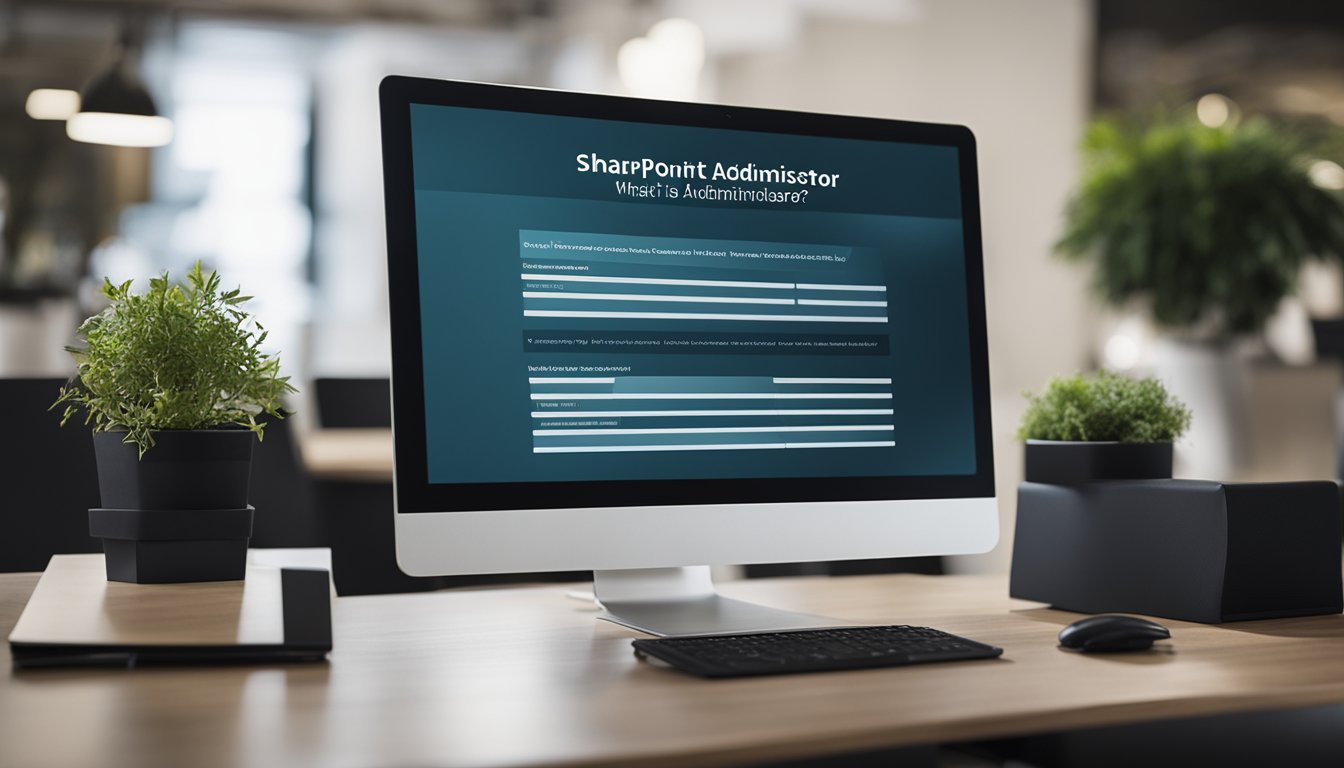What is a SharePoint Administrator Everything You Need to Know
As a SharePoint Administrator, I am responsible for overseeing the installation, configuration, and maintenance of SharePoint systems. SharePoint is a web-based collaborative platform that allows organizations to manage documents, share information, and collaborate on projects. A SharePoint Administrator is an essential role that ensures the platform is running smoothly and efficiently.

Understanding the Role of a SharePoint Administrator is crucial for any organization that uses SharePoint. A SharePoint Administrator is responsible for managing user permissions, creating and managing sites, and ensuring the platform is secure. They also provide technical support to users and troubleshoot any issues that arise. A SharePoint Administrator plays a critical role in ensuring that the platform is meeting the needs of the organization and its users.
Key Takeaways
- SharePoint Administrators are responsible for overseeing the installation, configuration, and maintenance of SharePoint systems.
- They manage user permissions, create and manage sites, and troubleshoot issues.
- SharePoint Administrators play a critical role in ensuring that the platform is meeting the needs of the organization and its users.
Understanding the Role of a SharePoint Administrator

As a SharePoint Administrator, my primary responsibility is to ensure that the SharePoint platform is running smoothly, securely, and aligns with the organization's goals. I am the linchpin that connects the needs of users with the technical capabilities of SharePoint.
The SharePoint Administrator role is essential in managing and maintaining SharePoint sites, managing sharing settings, and managing Microsoft 365 groups. I have access to the SharePoint admin center, where I can create, manage, and designate site admins.
In addition, I am responsible for managing Microsoft 365 groups, including creating, deleting, restoring groups, and changing group owners. As a SharePoint Administrator, I am also responsible for managing term store administrators, who are responsible for managing metadata within SharePoint.
The SharePoint Administrator role is just one of the many admin roles in the Microsoft 365 admin center. Other admin roles include Global Admins, Company Administrators, and SharePoint Service Administrators. Each admin role maps to common business functions and gives people in the organization permission to do specific tasks in the admin centers.
As a SharePoint Administrator, I work closely with Site Admins, who are responsible for managing and maintaining SharePoint sites. Site Admins can create and manage sites, manage site settings, and manage site permissions. They work with me to ensure that the SharePoint platform is running smoothly and securely.
In summary, the SharePoint Administrator role is critical in managing and maintaining SharePoint sites, managing sharing settings, and managing Microsoft 365 groups. I work closely with Site Admins to ensure that the SharePoint platform is running smoothly and securely.
Key Responsibilities and Tasks of a SharePoint Administrator

As a SharePoint Administrator, I am responsible for ensuring that the SharePoint platform runs smoothly and securely while aligning with the organization's goals. Some of the key tasks that I perform include:
-
Creating and Managing Site Collections: I create and manage site collections, which are a group of sites that share common features like settings, templates, and permissions. I also configure site collection features and settings to meet the needs of the organization.
-
Managing User Permissions: I manage user permissions to ensure that users have access to the resources they need while maintaining security. This includes creating and managing user accounts, assigning permissions, and managing access to document libraries.
-
Performing Maintenance and Troubleshooting: I perform maintenance on the SharePoint environment to ensure that it is running smoothly. This includes monitoring the system performance, troubleshooting issues, and resolving SharePoint issues or malfunctions. I also use PowerShell to automate tasks and streamline administrative tasks.
-
Configuring and Managing Services: I configure and manage SharePoint services, which are used to provide specific functionality to the SharePoint environment. This includes configuring and managing search, user profiles, and managed metadata services.
-
Managing Site Settings and Site Collection Admins: I manage site settings and site collection admins to ensure that they are configured correctly and have the necessary permissions to manage their sites. This includes setting up site collection administrators, managing site collection features, and configuring site settings.
Overall, as a SharePoint Administrator, I am responsible for ensuring that the SharePoint environment is secure, reliable, and meets the needs of the organization. I use my knowledge of SharePoint to perform a variety of tasks, including managing user permissions, performing maintenance and troubleshooting, and configuring and managing services.
Essential Skills and Knowledge for a SharePoint Administrator

As a SharePoint Administrator, I believe that there are several essential skills and knowledge that one should possess to be successful in this role. These skills and knowledge include:
Technical Support
As a SharePoint Administrator, I am responsible for providing technical support to users. This means that I should have a good understanding of SharePoint and be able to troubleshoot any issues that arise. I should also be able to provide guidance and advice to users on how to use SharePoint effectively.
Information and Communication
As a SharePoint Administrator, I am responsible for managing the information that is stored in SharePoint. This means that I should have a good understanding of how to organize and structure information in a way that is easy to find and use. I should also be able to communicate effectively with users to ensure that they understand how to use SharePoint and can find the information they need.
Power BI and SQL
As a SharePoint Administrator, I should have a good understanding of Power BI and SQL. This will allow me to create reports and dashboards that provide valuable insights into the data that is stored in SharePoint. It will also allow me to manage and maintain the databases that are used by SharePoint.
Collaboration
As a SharePoint Administrator, I should have a good understanding of how to facilitate collaboration between users. This means that I should be able to create and manage workflows that allow users to work together effectively. I should also be able to manage permissions and access to ensure that users only have access to the information that they need.
Technical Knowledge
As a SharePoint Administrator, I should have a good understanding of computer science and technical knowledge. This includes knowledge of the Windows operating system, networking, .NET, C#, HTML, and CSS. It also includes knowledge of Microsoft SharePoint, SQL Server, workflows, and backup and recovery procedures.
Overall, being a SharePoint Administrator requires a wide range of skills and knowledge. By possessing these skills and knowledge, I am able to effectively manage SharePoint and ensure that it is being used to its full potential.
SharePoint Administrator and Microsoft 365

As a SharePoint Administrator, I play a crucial role in managing and maintaining the SharePoint platform within Microsoft 365. Microsoft 365 is a cloud-based platform that provides a suite of productivity tools like Office 365, Exchange, OneDrive, Teams, and SharePoint.
In the Microsoft 365 admin center, I can manage user access, troubleshoot issues, and view activity reports. As a SharePoint Administrator, I have access to the SharePoint admin center, where I can manage site storage limits, site templates, and site collection administrators.
In Microsoft 365, a Microsoft 365 group is a single permissions group that is associated with various Microsoft 365 services, including a SharePoint site. A SharePoint site can be a communication site, a classic site, or a team site, depending on the organization's needs.
As a SharePoint Administrator, I can create and manage sites, designate site admins, manage sharing settings, and manage Microsoft 365 groups, including creating, deleting, and restoring groups, and changing group owners. I can also manage content management, documents, and external sharing.
To become a SharePoint Administrator, a bachelor's degree in information technology or a related field is preferred. I also need to have experience with SharePoint, Microsoft 365, and related technologies like Exchange, Teams, and Azure AD.
In summary, as a SharePoint Administrator, I am responsible for managing and maintaining the SharePoint platform within Microsoft 365. This includes managing sites, user access, troubleshoot issues, and ensuring the platform aligns with the organization's goals.
Frequently Asked Questions

What are the responsibilities of a SharePoint administrator?
As a SharePoint administrator, I am responsible for managing and supporting SharePoint applications. This includes creating and managing sites, assigning site administrators, managing sharing settings, and managing Microsoft 365 groups. I am also responsible for troubleshooting issues and implementing best practices to ensure the smooth operation of the platform.
What skills are required to become a successful SharePoint administrator?
To become a successful SharePoint administrator, I need expertise in Microsoft SharePoint, including knowledge of the platform's features, functions, and administration tools. I also need problem-solving capabilities to identify and resolve system issues, as well as communication abilities to understand user needs and provide support. Additionally, staying on top of SharePoint tech updates is crucial.
What is the difference between a SharePoint site owner and a SharePoint administrator?
A SharePoint site owner is responsible for managing the content and settings of a specific site. In contrast, a SharePoint administrator is responsible for managing the entire SharePoint platform, including multiple sites, users, and groups. While site owners have limited administrative privileges, SharePoint administrators have full control over the platform.
How much can a SharePoint administrator earn?
The salary of a SharePoint administrator varies based on factors such as experience, location, and industry. According to Payscale, the average salary for a SharePoint administrator in the United States is $75,000 per year.
What courses are available for SharePoint administrators?
There are many courses available for SharePoint administrators, including online courses, in-person training, and certification programs. Some popular options include the Microsoft SharePoint Administrator Certification Training, the SharePoint Training Course by LinkedIn Learning, and the SharePoint Administration Training by Pluralsight.
What are the steps to become a SharePoint administrator?
To become a SharePoint administrator, I need to acquire the necessary skills and knowledge through education, training, and experience. I can start by obtaining a degree in computer science or a related field. I can also gain experience by working as a SharePoint site owner or as a member of a SharePoint support team. Additionally, I can pursue certification programs to demonstrate my expertise in the platform.









